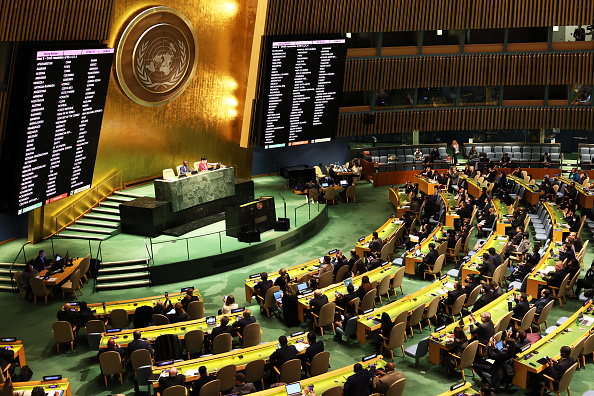The United Nations Human Rights Council (UNHRC) has approved a resolution condemning the burning of the Quran and urged countries to prevent and prosecute acts of religious hatred.
Pakistan and other Organization of Islamic Cooperation (OIC) countries brought forward a debate and resolution after a man in Sweden burned the Quran in front of a Stockholm Mosque on Eid-al-Adha. The incident sparked a diplomatic backlash across the Muslim world.
The 47-member council adopted the draft resolution after it received support from 28 members, with seven abstentions and 12 nations voting against it.
Those voting in favour included Bangladesh, China, Cuba, Malaysia, Maldives, Pakistan, India, Qatar, Ukraine and UAE. Nations voting against the resolution included Belgium, Finland, France, Germany, the UK and the US.
The @UN🇺🇳 Human Rights Council adopted a resolution in which it condemned & strongly rejected any advocacy & manifestation of religious hatred, including the recent public & premeditated acts of desecration of the Holy Quran.
WATCH the adoption of the resolution at #HRC53⤵️ pic.twitter.com/hnNBEzISu4
— United Nations Human Rights Council 📍 #HRC53 (@UN_HRC) July 12, 2023
The resolution “condemns and strongly rejects the recent public and premeditated acts of desecration of the Holy Quran, and underscores the need for holding the perpetrators of these acts of religious hatred to account in line with obligations of States arising from international human rights law”.
The Council requested the High Commissioner to present an update on the drivers and impacts of religious hatred and organise a panel discussion on the desecration of sacred books as manifestations of such hatred.
“Incitement to religious hatred”
During the debate, Muslim nations said the desecration of the holy Quran amounts to an incitement of violence and called for accountability.
On Tuesday, Pakistan’s Foreign Minister Bilawal Bhutto Zardari told the council: “We must see this clearly for what it is: incitement to religious hatred, discrimination and attempts to provoke violence.”
Ministers from Muslim countries, including Qatar, Iran, and Indonesia, made their objections clear.
“Stop abusing freedom of expression,” said Indonesia’s Foreign Minister Retno Marsudi. “Silence means complicity.”
Lolwah Rashid Al-Khater, Qatar’s Minister of State for International Cooperation, blamed agendas that “plant hatred and fuel seditions among Muslims and their communities’ people, in addition to provoking the belief of billions of human beings worldwide”.
Iran’s Foreign Minister Hossein Amir-Abdollahian urged Sweden and European nations to take “urgent and effective measures” against such incidents.
The Taliban administration released a statement announcing the suspension of all activities involving Sweden in Afghanistan “after the insulting of the holy Quran and granting of permission for insulting of Muslim beliefs.”
The debate exposed divisions between the OIC and Western nations. Although strongly condemning the burnings, western countries were more concerned about free speech than hate speech.
Some Western commentators have argued that the protests should be considered as hate speech, which is outlawed when it comes to race or ethnicity.
It comes as most Swedish people support a ban on the public burning of religious texts such as the Quran, according to a survey conducted by a major Swedish broadcaster. It marks a significant shift in public opinion over the burning of holy scriptures.




